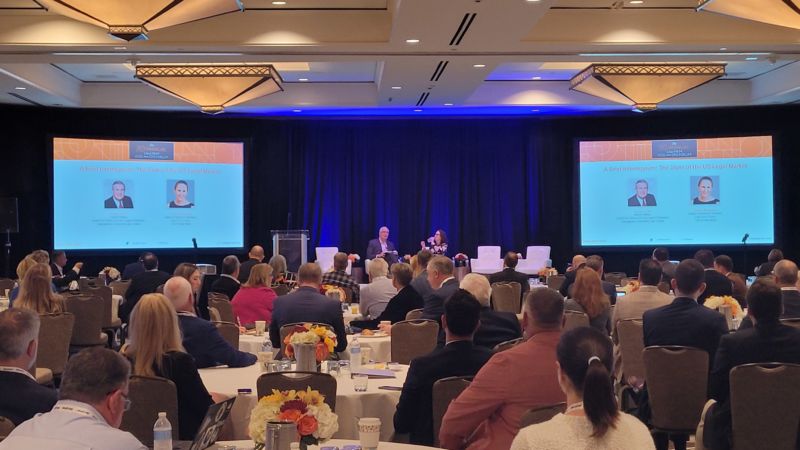In the opening presentation of the 20th Annual Law Firm COO & CFO Forum, the legal industry's deep concerns over finding and retaining top talent took center stage
NEW YORK — “We are seeing performance reminiscent of our last golden age.” With this, Gretta Rusanow, Head of Advisory Services for the Law Firm Group of Citi Private Bank, seemed to sum up both the hopes and apprehension of today’s legal industry in the opening presentation of the 20th Annual Law Firm COO & CFO Forum, which kicked off Thursday morning.
This hope was evident in that law firm profit was growing as fast as ever and that what was supposed to be an existential threat to the industry’s bright future was quickly receding in the rear-view mirror. Yet, there was also no shortage of apprehension. The war for talent loomed over every discussion, slipping into the conversation seemingly every other minute, with the worry that firms were having to go beyond their comfort zone to attract talent, but also towards retaining that talent which they had. In short, while things look like they had made a turn towards the positive, nobody seemed willing to accept that at face value.
Jim Jones, Senior Fellow at the Center on Ethics and the Legal Profession at Georgetown University Law Center, presented survey data from Thomson Reuters Institute’s upcoming Law Firm Business Leaders Survey to annunciate the point. The survey shows that there were positive outlooks in demand, with the vast majority of respondents predicting at least some growth in every practice area. At the same time, respondents cited their top three concerns, which all revolved around the war for talent. Rusanow concurred, showing that Citibank’s own law firm leader surveys shown that winning the talent war was the number one concern for firm leaders.

When it came to the topic of attracting new talent, Jones appeared to take on the atmosphere of a college lecturer, addressing the audience directly and making the point that money was a dissatisfier. If people felt that they were being underpaid, it would severely hamper their satisfaction with the job; however, the same did not apply in reverse. Paying more people than they believed they were worth had only the most marginal impact on satisfaction. Jones states that law firms had to stop trying to solve labor issues by throwing money at the problem, as they had done so for years.
A question from the crowd seemed to tee up the presenters to dig further into the talent questions when an audience member asked: Why are associates leaving firms at such an increased rate if money isn’t a key factor?
Rusanow suggests that first- and second-year associates only experience with their firms is staring at a screen for the last 18 months. Put simply, there was no glue to hold these associates to their current firms, allowing other firms to lure them away with incentives other than money, such as the opportunity to work in a new, exciting practice area that the associates could not hope to move into at their current firm. Otherwise, offers of improved work/life balance and greater geographic opportunity could persuade those lawyers who, because of remote work, may have little connection to the firm to leave for greener pastures.
Jones agreed, adding that in order to build that glue, law firms would have to focus on the softer stuff, such as personal relationships, mentoring, and showing associates a path forward within the firm. Indeed, law firms “sell themselves short when it comes to developing that glue,” Jones explains. “They need to start thinking about how they can use their different sections, such as billing or operations, as a support system that associates cannot take with them.” In other words, Jones notes, firms should “create golden handcuffs” that keep people at the firm.

Rusanow struck a similar tone, invoking Citi’s own law firm leader’s survey to show that in order to win the talent war, law firms had to deal with not only attracting new talent, but retaining their own talent — and that may be the more difficult task. For one, employee burnout seems to be a large and growing issue in the legal industry. For example, the good news that the transactional practice, specifically M&A, was seeing the greatest growth in memory, with both demand and rates increasing, is mitigated by the work pressure it’s caused on lawyers and staff.
There simply isn’t enough people to do the work, Rusanow says, adding that hours per lawyer were up 7.5% for most firms and up 10.5% for the largest firms. “And 2000 billable hours per year simply isn’t sustainable,” she adds. Furthermore, the COVID-19 pandemic has shifted mindsets and expectations, to say the least; and those factors that saw their importance overshadowed by the pandemic are now reasserting themselves, forcing firms to adapt.
Clearly, 2020 is “such an unusual year,” Jones says, and the implication that 2021 and 2022 would be unusual as well in their own ways lingered over the presentation. The war for talent, which has permeated every discussion at the Forum, loomed as a large enough threat that nobody could be sure that the dawn of another golden age is upon the legal industry.
At the same time, the obstacles seemed surmountable, the lessons practical, and both Jones and Rusanow were clear that a good dose of apprehensive positivity is warranted.







